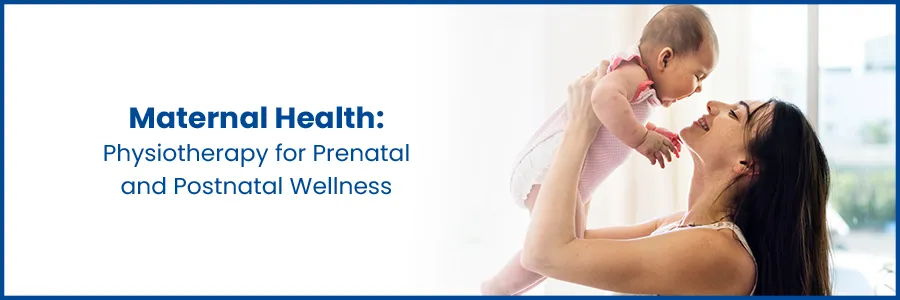- Cardiology 84
- Dermatology 45
- Endocrinology 33
- ENT 16
- Fertility 190
- Gastroenterology 78
- General-Medicine 81
- Gynecology 80
- Hematology 19
- Infectious-Diseases 33
- Neurology 52
- Oncology 34
- Ophthalmology 23
- Orthopedics 69
- Pediatrics 31
- Procedure 23
- Public-Health 144
- Pulmonology 59
- Radiology 8
- Urology 68
- Wellness 161
- Woman-and-child 77

Maternal Health: Physiotherapy for Prenatal & Postnatal Wellness
Maternal health encompasses the physical, emotional, and mental well-being of expectant and new mothers. Pregnancy and the postpartum period bring significant changes to a woman's body, emphasising the importance of health care during these phases.
Physiotherapy, recognised for its holistic approach, has become a pivotal means of supporting women's health during both prenatal and postnatal stages. This blog explores the benefits of physiotherapy in promoting maternal wellness.
Physiotherapy during Pregnancy
Pain Management
As pregnancy progresses, many women experience back pain, pelvic discomfort, and joint issues due to shifting weight distribution. Physiotherapists offer tailored exercises to alleviate pain, improve posture, and strengthen core muscles.
Pelvic Floor Health
Pregnancy and childbirth stress the pelvic floor muscles, leading to issues like urinary incontinence and pelvic organ prolapse. Physiotherapy includes exercises to strengthen these muscles, promoting better control and preventing complications.
Preparation for Labor
Physiotherapists guide expectant mothers through breathing techniques and relaxation exercises. These practices help manage anxiety and promote effective breathing during labour.
Body Awareness
Pregnancy alters a woman's centre of gravity, affecting balance and coordination. Physiotherapy improves body awareness, reducing the risk of falls and injuries.
Physiotherapy during Postpartum
Pelvic Floor Rehabilitation
Postpartum, weakened pelvic floor muscles can lead to bladder control issues. Physiotherapy provides exercises to aid muscle recovery and enhance bladder and bowel control.
Diastasis Recti Management
Many women experience diastasis recti, where abdominal muscles separate after childbirth. Physiotherapists offer exercises to gradually close the gap and restore core strength.
Restoring Core Strength
Pregnancy weakens core muscles. Physiotherapy focuses on rebuilding core strength through targeted exercises, improving stability and preventing back pain.
Posture Correction
Breastfeeding and baby care can strain posture. Physiotherapy addresses postural issues and provides exercises to realign the body.
Emotional Well-being
Physiotherapy not only addresses physical concerns but also offers a supportive environment for new mothers to discuss emotional challenges, contributing to better mental health postpartum.
Choosing a Physiotherapist
When seeking physiotherapy for maternal health, consider the following:
- Specialisation: Choose a physiotherapist experienced in women's health and prenatal/postnatal care.
- Personalised Approach: Each woman's needs are unique; a good physiotherapist tailor exercises accordingly.
- Communication: Effective communication is crucial for personalised care; ensure your concerns are heard and addressed.
- Postpartum Timing: Physiotherapy can begin a few weeks after childbirth, but consult your healthcare provider first.
Benefits of Physiotherapy
Physiotherapy offers numerous benefits:
- Pain Relief: Tailored exercises alleviate discomfort during pregnancy and postpartum.
- Muscle Strengthening: Core muscles are strengthened, stabilising the body.
- Pelvic Health: Exercises target the pelvic floor muscles, promoting better bladder control and preventing prolapse.
- Postural Correction: Physiotherapists address pregnancy and breastfeeding-related postural issues.
- Holistic Care: Physiotherapy supports emotional well-being alongside physical recovery.
Effective Treatment Approaches
Case 1: Gestational Diabetes Management: Rebecca manages gestational diabetes through diet, exercise, and regular monitoring under medical supervision.
Case 2: Postpartum Depression Intervention: Jennifer copes with postpartum depression through therapy, support groups, and possibly medication, supported by her healthcare team and loved ones.
Essential Nutrition for Maternal Health
Case 1: Balanced Pregnancy Diet: Danielle, in her third trimester, prioritises whole grains, lean proteins, and nutrients like folic acid and iron for a healthy pregnancy.
Case 2: Postpartum Nutrient Replenishment: Maria focuses on nutrient-dense foods after childbirth, emphasizing omega-3 fatty acids, iron, and protein for recovery.
Nutritional Guidelines:
- Prenatal Diet: Emphasize folic acid, iron, calcium, and protein; stay hydrated and limit caffeine and processed foods.
- Postpartum Diet: Prioritize nutrient-dense foods, including lean proteins, whole grains, fruits, and vegetables; hydration supports milk production and recovery.
Conclusion
Maternal health, encompassing physical, emotional, and mental aspects, is vital during pregnancy and postpartum. Physiotherapy plays a crucial role in supporting women's wellness by addressing physical discomforts, pelvic health, emotional well-being, and more. Consider integrating physiotherapy into your healthcare regimen as an expectant or new mother for a smoother journey through motherhood and enhanced overall well-being.
Always consult your healthcare provider before starting any new exercise routine, especially during pregnancy and postpartum.
Frequently Asked Questions
Physiotherapy involves exercises and techniques to help pregnant and postpartum women stay healthy, manage pain, and regain strength.
Physiotherapy eases back pain, improves posture, and prepares for labour through tailored exercises and advice.
Yes, it helps restore core strength, pelvic muscles, and posture postpartum.
Conditions like gestational diabetes and high blood pressure may need close monitoring and treatment.
A balanced diet with nutrients like folic acid, iron, and calcium supports both the mother's and baby's health.
Nutrient-dense foods rich in protein, omega-3s, and iron aid in recovery and well-being.
Connect with healthcare providers, family, and friends for emotional and practical support.
Consult a healthcare provider; generally, physiotherapy can begin during pregnancy and a few weeks after childbirth.
Exercises like pelvic tilts and gentle stretches are generally safe and beneficial.
Ask your healthcare provider for recommendations or do online research for physiotherapists, doctors, and dietitians specializing in maternal health.

- Cardiology 2132
- Dermatology 168
- Endocrinology 135
- ENT 97
- Fertility 217
- Gastroenterology 232
- General 478
- General-Medicine 1685
- Gynecology 169
- Hematology 85
- Infectious-Diseases 208
- Neurology 207
- Oncology 345
- Ophthalmology 65
- Orthopedics 187
- Pediatrics 83
- Procedure 72
- Public-Health 209
- Pulmonology 126
- Radiology 13
- Second Opinion 311
- Urology 294
- Wellness 600
- Woman-and-child 447
- Others 10217
Related Blogs
If you have any questions, please fill out the enquiry form or call us, and we will get back to you promptly.
040-68334455